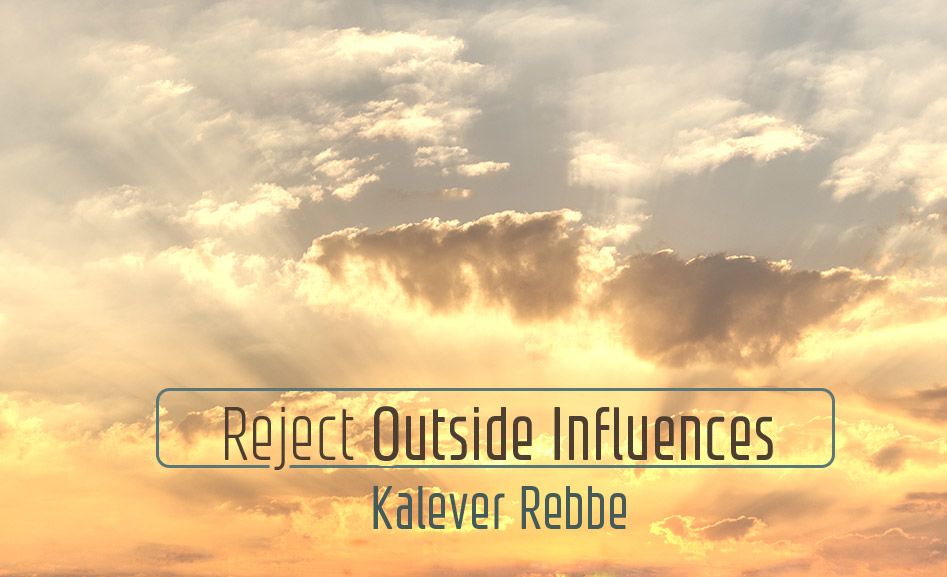
Do Men Need Mikvah? Part 2
A fallacy that many people think is that immersion in the mikva for men is only for Chassidim. Nothing could be further from the truth, for the true...

The Gaon of Vilna (Gra)
Rabbi Yisroel Mishklov one of the greatest students of the Gra writes in his name that the Gra was extremely stringent about a Baal Keri immersing in the Mikvah. The Sefer Bais Yackov writes “ The Gra was very careful about the immersion of a Baal Keri before he prayed. Rabbi Moshe Shternbach writes about the fact that many in the Yeshivot today do not go to the Mikvah. It is a great wonder to him for the Gra was very stringent about having people go to the Mikvah. All this came about since all the Gedolim would go to the Mikvah in secrecy for reasons of modesty and many would not announce that they went to the Mikvah every day for this reason. It came out, in the end that people assumed that the Gedolim of Lithuania did not hold of going to the Mikvah. Rabbi Shternbach then writes that this is completely wrong and it is the exact opposite and who ever can, should spread this so people do not deal in holiness while their body is impure.
The Customs of Gedoli Yisroel
The Gaon Rabbi Akiva Egar Z”L would go every morning to immerse in the Mikvah, he did was not held back by rain or snow. Even in the days of the winter when the water was frozen he would still go. He was careful to go early in the morning before sunrise. Once when he was feeling ill his wife hid the keys to the Mikvah to prevent him from going. A half an hour later the Shamesh came knocking on the door with a different set of keys and said that the Rabbi had just appeared to him in a dream telling him to bring over the keys.
Rabbi Aryeh Leib said over about his father the Chafetz Chaim would always talk about the importance of the Mikvah and he himself never missed going to the Mikvah in his life. He also writes over a story about a time when the water was boiling hot and the Chafetz Chaim was moser nefesh (sacrifice himself) to immerse. When he came out he fainted and remained unconscious for a number of hours.
The Nitziv from Volozhin would very often go to immerse in the Mikvah especially before Shabbat and Chagim.
Rabbi Yitzchok Elchanan Specter would immerse in the Mikvah at every chance he got often a number of times every week. Even in his old age when he was very weak he would force himself to go.
Rabbi Elyah Lapian told over that once a kollel man entered the Yeshiva and the Saba from Kelm saw with his Ruach Hakodesh that the man needed a Mikvah. He immediately yelled at him for not going to the Mikvah and told him to go immediately. When he told this story to Rabbi Yaakov Kaminetsky he replied that all the Gedolim of Lithuania were very careful about going to the Mikvah however since they went secretly for reasons of modesty it became forgotten.
In Taharas Hashabos Rabbi Chaim Shpitzer writes that he asked Rabbi Yaakov Kaminetsky if the Gedolim in Lithuania were careful about going to the Mikvah. Rabbi Kaminetsky looked at him in wonder and said of course they were careful about going to the Mikvah.
The Alter from Novhardok would immerse every morning in the Mikvah only after checking that no one was looking.
Rabbi Mosh Feinstein writes that the Mikvah is necessary for anyone who wishes to progress in righteousness and spiritual growth.
Rabbi Banish Finkel would secretly immerse in the Mikvah including on Shabbat.
The Bircat Shmuel from Kamanitz was very careful and greatly respected the Mikvah. Rabbi Shlomo Volbe told over that he once visited Rabbi Baruch Ber in Kamanitz for a Shabbat and he was told by the students that only a person that immersed in the Mikvah could go and say good Shabbat to the Rosh Yeshiva since he was able to sense it.
The Alter from Slovodka was known for immersing in the Mikvah. He also stated that it was his wish that they should build a Mikvah in his Yeshiva in Hevron.
Rabbi Elchanan Wassermen would never miss going to to the Mikvah including on Shabbat.
Rabbi Ahron Kotler once over heard someone saying that the Gedolim of Lithuania did not go to the Mikvah. He immediately growled at him and said “The lips of a person that speaks lies should go mute.” Rabbi Berel Schwartzman once saw Rabbi Ahron Kotler immersing in the Mikvah on Erev Shabbat Chazon. He asked him how he could do so for only a person who goes all year round is permitted. Rabbi Kotler answered that the whole year round he is physically unable to go to the Mikvah for the great time-consuming responsibilities are on his shoulders but in the summer he goes since there is more time it is therefore as if he goes all year round.
Rabbi Avrahom Kalmanazitch commanded that they build a Mikvah in his Yeshiva, since he said that it was impossible to attain perfection in Torah without a Mikvah. His grandson testified about him that he would go to the Mikvah even on Shabbat with great dedication in the cold and snow a trip that was forty minutes in each direction.
Rabbi Nasson Vachtfogel was very careful to immerse every day even in his old age. Many times he would go to the Mikvah more than once in a single day. He used to encourage all his close students to go to the Mikvah. He was very happy when they built a Mikvah near his Yeshiva.
Rabbi Shlomo Elyashuv would go to the Mikvah every single day until he reached very old age. He would often go at four in the morning, sometimes even as early as two am.
Rabbi Yehuda Zev Segal the Rosh Yeshiva of Manchester writes the following in a letter: Rabbenu Yonah writes that one’s prayers are more accepted if he goes to the Mikvah. We therefore have to do everything in our power that our prayers should be accepted, since all our power is only through prayer. Certainly today when our prayers are very weak at least it should be done when we are pure. I am strongly recommending that all Avrachim, students of Torah and Rabbaim should be very careful with Tevilat Ezra.
Mikvah on Erev Shabbat
Rabbi Chaim Kanievsky was asked if one can take off time from learning to immerse in the Mikvah on Erev Shabbat. He answered “For sure, it is a Mitzvah”. He also said that the Chazon Ish said that one should go to the Mikvah on Erev Shabbat.
The Ramchal writes: On Erev Shabbat after Chatzot prepare yourself for Shabbat and go immerse to purify yourself from the impurity of the six days of the week. One who immerses removes all the flaws. He may immerse as many times as he wishes as long as the first time is to remove impurity of his sins and the last time to receive the holiness of Shabbat.
It says in the Zohar: When Shabbat comes in the holy nation must rinse themselves from the activity of the week. What is the reason, since during the week a different spirit goes and rests on the nation. When a person wishes to leave that spirit and enter a higher holier spirit he must immerse to receive that holier spirit.
Pela Yoetz: If at a regular time purifying oneself in the Mikvah is good it is much more so on Erev Shabbat, Chagim and Rosh Chodesh. One has to do preparation to receive the holy influx that comes down on those days.
In Sefer Zichru Toras Moshe from the Chai Adam he writes that a person who is righteous and his actions are good, if he immerses in the Mikvah on Erev Shabbat to receive the Holiness of Shabbat he will defiantly feel the additional Shabbat soul. These has been tested and proven by many people. However if he is impure then he will not feel the holiness of Shabbat.
Rabbi Chaim Vital writes in Shar Hakavanot that his master the Arizal said that the holiness of Shabbat can be seen on a person’s forehead immediately after he immerses. However the main light does not come down until after Chatzot.
Sefer Hakana – One who immerse on Erev Shabbat Hashem accepts his prayer and binds him with love.
Yesod Veshoresh Havoda – One should immerse on Erev Shabbat so he will not enter Shabbat while impure. Even a person that is not impure it is still a great Mitzvah for him to immerse on Erev Shabbat. For immersing in the Mikvah helps one attain the extra Shabbat soul which he will defiantly not receive if he does not immerse.
Reishit Chochma – The main thing a person can do with his body on Erev Shabbat to acquire purity and Holiness is to immerse in forty sah, to remove the garment of the week and replace it with the garment of Shabbat.
Immersing in the Mikvah on Shabbat
(One should first learn the laws of Shabbat to avoid any forbidden acts)
The Shulchan Aruch writes that it is permissible for a person to immerse for his impurity on Shabbat and this has become customary. One should just be very careful not to come to Sechitah (squeeze water out of a towel, and the like) which is completely forbidden.
Rabbi Moshe Shternbuch shlit’a said he heard from an eye witness that the Chafetz Chaim would go to the Mikvah on Shabbat.
The Steipler was asked if one could go to the Mikva hon Shabbos. He answered in great wonder it is clear that one can immerse on Shabbat, is it possible to pray without first going to the Mikva?!”
Rabbi Elyashiv shlit’a also says that it is permissible to go since there is not one person that argues with the Mishna Berura regarding this. This is also the opinion of the Gra that a person can immerse for his impurity on Shabbat he just has to be very careful not to do Sechita. Even a person that is not impure but wishes to immerse to receive greater holiness there is also no problem with that.
The Kitzur Shulchan Aruch writes straight out that a person can immerse on Shabbat if he saw Keri.
The Chai Adam also writes that it is permissible as long as he does not squeeze the water from his hair.
In light of the above, one can no longer hide behind the myth that Yeshiva students, those who follow Lithuanian custom, or anyone else are exempt from mikva. People that want holiness don’t look for exemptions. May Hashem send a spirit of purity throughout the People of Israel, amen.
(For more information on mikva and shmirat Habrit, see www.briskodesh.org)








Tell us what you think!
Thank you for your comment!
It will be published after approval by the Editor.